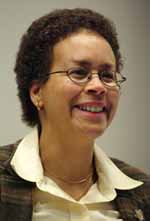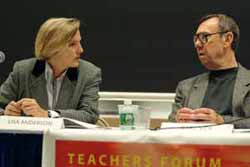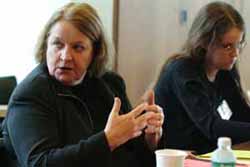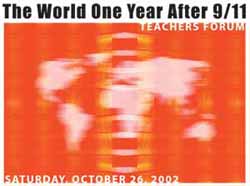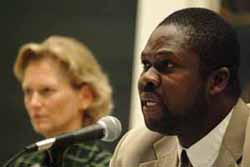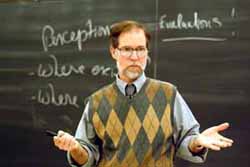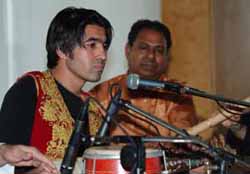One Year After 9/11: The Challenges to Teaching Diversity, Culture, and Media Literacy
How can educators help their students understand the rapid sequence of world events since September 11th, 2001? What are the best approaches to teaching current events-and the historical circumstances shaping them-in a culture where teachers are increasingly pressed to raise scores on standardized tests? What methods, media, and literature exist to inform students about societies and viewpoints other than their own?
These were among the issues identified and discussed at the October 26th Teachers Forum, "The World One Year After 9/11," held at Columbia's School for International and Public Affairs (SIPA) in partnership with Teachers College. The day-long forum covered various geopolitical, social, and educational landscapes in transition since 9/11, leading off with panels on Islamic movements in Central Asia, North Africa, and the Middle East, and a discussion of Muslim perspectives from communities in New York City, Africa, and Europe.
Throughout the day, and particularly in the Forum's workshops, participating teachers and session leaders often returned to discussing how to deal with students' concepts of "the other," whether in the classroom or in countries around the globe. Within the context of the Forum, this meant looking at ideas and images of Muslims, Islam, and many developing nations since 9/11, including strategies to help students think critically about the media, and become more adept at recognizing media "spin," as well as authentic sources of information.
"The effort to educate students about who Muslim people are requires that we separate fact from fiction-not always an easy task in today's volatile atmosphere," said TC Dean Darlyne Bailey in her opening remarks. "Since September 11th of last year, we have seen what can only be characterized as mass miseducation, largely by the popular media. TV and radio talk shows, and the tabloid press, use rhetoric that feeds into ignorance, fostering an 'us-versus-them' mentality. Is it possible, then, that our students, who have been steadily exposed to such messages, could remain unaffected?"
SIPA Dean Lisa Anderson, who joined Bailey in opening the Forum, noted that of 350 students currently in the school's Masters program in Public Affairs, about half are international students from roughly 97 countries. This interaction of education and globalization "causes us to ask ourselves what diversity means, what liberalism means," Anderson said. "New demands imposed by diversity, and the velocity at which the world is changing, means that we must return and rethink the world, as well as teaching and learning. With the inclusion of Teachers College, we widen the circle of people with whom we have these discussions."
In addition to hearing from scholars and policy experts about the evolution of events in the Muslim world, teachers attending the Forum were able to get some advice and materials for their classroom practice. During one question-and-answer session, a teacher asked about the best method of teaching about current events at a time when his school's priority is to raise test scores, and students have only limited resources to learn about world cultures and countries. Margaret Crocco, Associate Professor of Social Studies and Education at TC, added that this question was especially relevant in terms of Africa, where a lack of accurate coverage continues to feed misperceptions. "There aren't many American newspapers with reporters in Africa, and so there is not enough information or news coming out of Africa" noted Ousmane Kane, Associate Professor of International and Public Affairs at SIPA. "But the best way to find out what African people are thinking is to have your students read what African people are writing about themselves, what they are thinking about themselves. That is the best, most direct source."
Looking at what people in Muslim societies are writing about themselves was the focus of Ruth Vinz's and Greg Hamilton's workshop, "Becoming (Other)Wise: Learning about the Muslim World Through Literature." Using a range of telling excerpts from children's and young adult literature, authors' depictions of life experiences from Lebanon, Afghanistan, and throughout the Muslim world were examined in light of how students could connect the content to their own experiences-"beyond empathy, sympathy, or 'exotica,'" Vinz told teachers at the afternoon workshop. "Students need to see themselves in the stories. If they don't see themselves, how can they relate to the text?" Vinz added that a major challenge in teaching cultural literacies has been to identify materials that steered away from stereotype, and were complex enough to engage students. Vinz is the Enid and Lester Morse Professor in Teacher Education and Hamilton is Assistant Professor of English Education at TC.
In addition to looking at issues of cultural literacy, equally vital to the day's discussions were exchanges about media literacy, the subject of Louis Cristillo's workshop, "Perceptions of Islam One Year Later." Cristillo noted that the media's messages, including messages about Islam and Muslims, have shifted over the course of time since the 9/11 tragedy. "Before 9/11, media coverage of the Muslim world was episodic. Now, there are feature articles and more in-depth coverage, more frequent coverage. When that happens, perceptions change, and viewers are not as quick to blame or identify a 'perpetrator,'" said Cristillo, a Ph.D. Candidate in Anthropology and Education at TC.
However, the media's messages are in fact "products," including messages about Muslims and Islam, Cristillo said. "Messages can become perceptions, and it's critical to understand how those messages can shape people's actions, promoting hatred or tolerance. In the beginning, people who were part of the American mosaic on September 10th became 'the other' on September 11th."
In addition to "Learning About the Muslim World Through Literature," and "Perceptions of Islam One Year Later," concurrent afternoon workshops included "Human Rights and Peace Education," and "Exploring Globalization Through Critical Pedagogy."
A mid-day musical interlude was provided by a four-piece ensemble led by Quraishi, an Afghan master of the rebob, a stringed instrument native to the mountain regions of Afghanistan. The ornately decorated rebob is constructed mostly from hollowed-out mulberry wood and, similar to several stringed Indian instruments, has three "main" topmost strings which carry the primary melody, and two sets of "sympathetic" strings that vibrate as the instrument is played.
This recent Forum was a continuation of the post-9/11 conversations and workshops held in January 2002. That earlier Forum, "TC's Teach-In: Responding to 9/11," began the joint TC-SIPA dialogues about teaching and learning in the face of global change. As in January, the Christian A. Johnson Endeavor Foundation helped sponsor the October event.
Published Monday, Feb. 24, 2003
